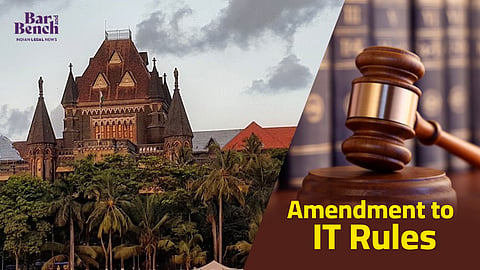
- Latest Legal News
- News
- Dealstreet
- Viewpoint
- Columns
- Interviews
- Law School
- Legal Jobs
- हिंदी
- ಕನ್ನಡ

The Central government on Wednesday clarified that online platforms or intermediaries have no choice but to take action on content flagged by Fact Check Units (FCUs) to be formed under the recently amended Information Technology Rules of 2023.
Solicitor General Tushar Mehta made the submission while answering a query posed by Justices GS Patel and Neela Gokhale yesterday on whether there was an option for an intermediary to not act on notifications issued by the FCU.
Mehta, who appeared for the Union Ministry of Electronics and Information Technology (MEITY), clarified today that intermediaries had two options on how to act when content is flagged by an FCU.
Not taking any action is not an option available to the intermediaries, he said.
“The resolution of the issue can be either by taking down the fake or false part, or, depending upon the nature of the content, by putting a disclaimer (at the risk of the intermediary). There is no third option of not doing anything about it."
The Court was hearing petitions filed by stand-up comic Kunal Kamra, the Editors Guild of India, the Association of Indian Magazines and the News Broadcast and Digital Association challenging the Information Technology (Intermediary Guidelines and Digital Media Ethics Code) Amendment Rules, 2023.
The petitioners have specifically challenged Rule 3, which empowers FCUs to identify and flag what it considers ‘false or fake online news’ with respect to the government's activities.
Mehta had argued yesterday that when an FCU flags content to the intermediary, it may have three options, that is: (a) to take it down or (b) to not take it down but put a disclaimer that the content has been flagged, and (c) ignore the communication by the FCU.
The Court then asked why the amendment was required at all if the government was not going to mandate that intermediaries must comply with the FCU communication.
Mehta responded to the query today after taking instructions.
In his submissions before the Court yesterday, Mehta argued that the Rules did not prohibit any expression of opinion or critical analysis against the government. He asserted that they were only intended to rein in false news. He added that only patently false, fake, or misleading content would be flagged, and not satire or humour.
Mehta has concluded his submissions in the matter. The Court will now hear rejoinder submissions by the petitioners. The hearing will continue on Friday.
During a hearing in July, the Court had asked the Centre why the Rules concerning powers granted to FCUs could not apply to all online content, irrespective of whether that content is about government business.
In an affidavit, MeitY had justified introducing the Rules, saying that one-sided information would be spread across social media about government activities and citizens may act on it without or before government makes an official announcement.
Previously, the Court observed that the government may have come up with FCUs because of the power and extent of the internet.
“You do not understand the extent of the realm, reach and power of technology. This would not have been necessary in case of print. You just do not understand what the internet can do. Governments cannot do away with the internet as that is where they carry out their business. But it comes with its limitations. This is more like the fear of the unknown. And this is why the government has come up with this (FCU). Whether it is legitimate or not is what we have to decide."